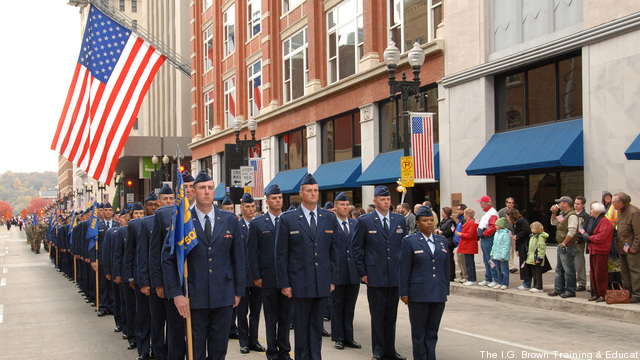Trust Us On Air Guard Cuts, Air Force Tells Congress
Posted on

CAPITOL HILL: “Trust us.” That’s the last thing an irate Congress is ready to hear from the Air Force right now, but it’s the essence of what a three-star general told legislators today in a hearing on the administration’s hugely unpopular proposal to cut the Air National Guard.
A Senate-proposed commission on the size and structure of the Air Force would be a bad idea, said Lt. Gen. Christopher Miller, the Air Force’s Deputy Chief of Staff for Strategic Plans and Programs, in response to questioning by Guamian Rep. Madeleine Bordallo, top Democrat on the readiness panel of the House Armed Services Committee. Instead, Congress should let the Air Force and the Defense Department keep working through the contentious issue of cutting the Air Guard the way they have been, in the Pentagon’s internal planning process and in closed-door consultations with the Council of Governors.
That’s asking Congress to trust the very process that many legislators at the hearing denounced as opaque and unaccountable. The readiness subcommittee chairman, Rep. Randy Forbes, said the Air Force had imposed “gag orders” prohibiting key personnel from discussing the decision-making on Guard cuts with Congress and told Lt. Gen. Miller, “Take this message back to them, that you’re seeing a lot of members that are tired by this lack of transparency.”
Both the other witnesses present endorsed the idea of a commission: Iowa Governor Terry Branstad, co-chair of the Council of Governors, and Maj. Gen. Timothy Lowenberg, adjutant-general of the Washington state National Guard, who emphasized he was testifying on behalf of his state without any review or approval from the Pentagon. Both said the Defense Department’s consultation with the states about the cuts has been lacking from the start – and it still is.
“We were kept in the dark until this was announced, and that goes against the whole purpose of having a Council of Governors” in the first place, said Gov. Branstad. “This last year was a disaster.” Nor have things gotten much better. “We’re going to be meeting this weekend,” he said, but “it doesn’t look like the Secretary of Defense is going to be able to attend.”
Throughout the year-long budget planning process, added Maj. Gen. Lowenberg, no senior Air Force leader met with the Council. While the Pentagon has negotiated with the governors since the budget came out and the Council came out with a counter-proposal, it has done so “in a very superficial way: There’ve been four meetings,” he said. “Less than 15 minutes into the second meeting… Air Force leaders pronounced everything about the Council of Governors’ proposals totally unacceptable.”
Several legislators at the hearing said they too had difficulties getting information out of the Air Force about the logic behind the proposed Guard cuts. Iowa Democrat David Loebsack, for one, said there is “a lot of frustration over the transparency of the process, a lot of frustration over the lack of communication.”
“This year,” Miller admitted, “there were some very additional constraints” on who could participate in the budget process, which had the “very difficult” challenge of implementing both the Budget Control Act and the administration’s new strategic guidance. That said, Miller went on, “there was certainly more control over information than in most years but it was not absolute.”
But other services didn’t have that problem, retorted Maj. Gen. Lowenberg. “The governors were very clear in commending the Secretary and the Chief of Staff of the Army for having a transparent process [this year],” said Lowenberg. The Army didn’t require nondisclosure agreements.”
Indeed, the active-duty Army has been working unusually well with its Guard and Reserve components of late, overcoming years of contention, while the normally harmonious active-reserve relationship in the Air Force is breaking down: “It was clear in each of our four meetings that Air Force and National Guard bureau leaders agree on very little,” Lowenberg told the subcommittee. The Guard Bureau estimated that the Council of Governors’ counter-proposal on the cuts would save the military $700 million; the Air Force staff said it would add $284 million in costs, Lowenberg said: “That’s a $984 million variance working on the same facts.”
The Guard Bureau failed to account for some key costs, Lt. Gen. Miller responded, such as maintaining and modernizing all the aircraft that the Council wants to keep instead of retire.
The Air Force will work with a commission if Congress chooses to create one, of course, Lt. Gen. Miller said in response to Rep. Bordallo’s question. (So far, the Senate Armed Services Committee has proposed the commission in its version of the authorization bill, but neither the full Senate nor the House has taken action). But, he said, “we are concerned that a commission… would have a very difficult job ahead of it to go through the levels of detail required in the time allotted, and the decisionmaking coming out of that commission would be very difficult to reflect in the ’14 budget.”
At the very least, Miller said, Air Force and Air Guard personnel would be “in a very uncomfortable state of suspended animation” while they awaited word on whether the commission would cut or keep their units. Given how upset and demoralized many in the Guard already are – and how successfully they’ve conveyed that distress to Congress – Miller’s argument is unlikely to get much traction on Capitol Hill.
Subscribe to our newsletter
Promotions, new products and sales. Directly to your inbox.
